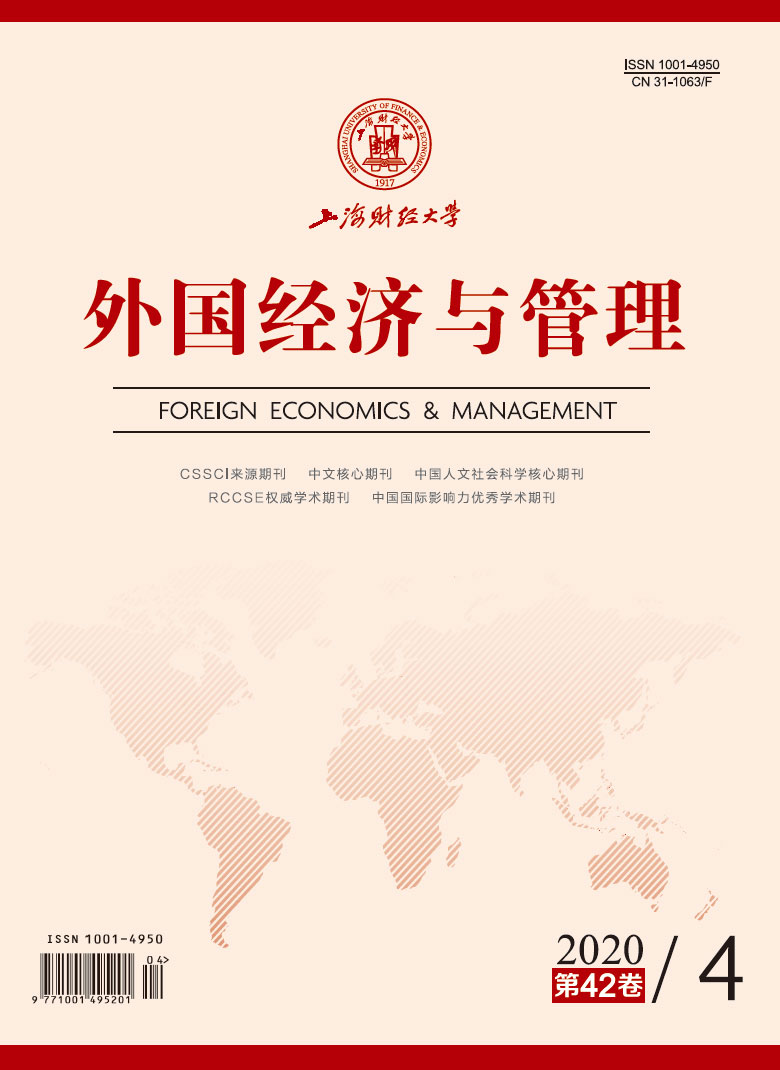员工管家行为是员工在日常工作中像组织的“管家”一样主动以组织长远利益为重的亲组织行为,体现了员工对组织的主人翁精神,对于组织的长远发展十分有利。在现代社会工作家庭冲突加剧的背景下,家庭支持型主管行为由于有助于员工平衡工作与家庭的关系,能够增强员工对组织的归属感和责任感,从而可能提升员工的管家行为。本文通过对97名工作团队主管及其下属的有效配对数据进行统计分析发现:家庭支持型主管行为对员工管家行为产生积极影响,该过程是通过内部人身份认知的中介作用实现的;积极情绪氛围能够增强内部人身份认知对员工管家行为的积极影响,同时积极情绪氛围对内部人身份认知在家庭支持型主管行为与员工管家行为之间的中介效应具有强化作用。本文拓展了家庭支持型主管行为影响效果的理论研究,为管理者采取有效的领导风格激发员工管家行为提供了理论依据。
家庭支持型主管行为对员工管家行为的影响
摘要
参考文献
3 康勇军, 王霄, 彭坚. 组织结构影响管家行为的双路径模型: 观点采择和情感承诺的中介作用[J]. 南开管理评论,2018, (4): 148-157. DOI:10.3969/j.issn.1008-3448.2018.04.014
6 刘小禹, 孙健敏, 周禹. 变革/交易型领导对团队创新绩效的权变影响机制——团队情绪氛围的调节作用[J]. 管理学报,2011, (6): 857-864. DOI:10.3969/j.issn.1672-884X.2011.06.011
7 刘云, 张文勤. 经理人管家主义行为研究回顾与展望[J]. 华东经济管理,2013, (9): 153-158, 164. DOI:10.3969/j.issn.1007-5097.2013.09.033
11 施丹, 陶祎祎, 张军伟, 等. 领导—成员交换关系对产业工人敬业度的影响研究[J]. 管理学报,2019, (5): 694-703. DOI:10.3969/j.issn.1672-884x.2019.05.008
13 王三银, 刘洪, 刘润刚. 类亲情交换关系视角下家庭支持型主管行为对员工帮助行为的影响研究[J]. 管理学报,2018, (7): 980-987. DOI:10.3969/j.issn.1672-884x.2018.07.005
15 Armstrong-Stassen M, Schlosser F. Perceived organizational membership and the retention of older workers[J]. Journal of Organizational Behavior,2011, 32(2): 319-344. DOI:10.1002/job.647
16 Ashkanasy N M, Humphrey R H. Current emotion research in organizational behavior[J]. Emotion Review,2011, 3(2): 214-224. DOI:10.1177/1754073910391684
17 Bagger J, Li A. How does supervisory family support influence employees’ attitudes and behaviors? A social exchange perspective[J]. Journal of Management,2014, 40(4): 1123-1150. DOI:10.1177/0149206311413922
18 Bosch M J, Las Heras M, Russo M, et al. How context matters: The relationship between family supportive supervisor behaviours and motivation to work moderated by gender inequality[J]. Journal of Business Research,2018, 82: 46-55. DOI:10.1016/j.jbusres.2017.08.026
19 Choi J, Kim A, Han K, et al. Antecedents and consequences of satisfaction with work-family balance: A moderating role of perceived insider status[J]. Journal of Organizational Behavior,2018, 39(1): 1-11. DOI:10.1002/job.2205
20 Crain T L, Stevens S C. Family-supportive supervisor behaviors: A review and recommendations for research and practice[J]. Journal of Organizational Behavior,2018, 39(7): 869-888. DOI:10.1002/job.2320
21 Davis J H, Allen M R, Hayes H D. Is blood thicker than water? A study of stewardship perceptions in family business[J]. Entrepreneurship Theory and Practice,2010, 34(6): 1093-1116. DOI:10.1111/j.1540-6520.2010.00415.x
22 Edwards J R, Lambert L S. Methods for integrating moderation and mediation: A general analytical framework using moderated path analysis[J]. Psychological Methods,2007, 12(1): 1-22. DOI:10.1037/1082-989X.12.1.1
23 Gong Y P, Chang S, Cheung S Y. High performance work system and collective OCB: A collective social exchange perspective[J]. Human Resource Management Journal,2010, 20(2): 119-137. DOI:10.1111/j.1748-8583.2010.00123.x
24 Hammer L B, Ernst Kossek E, Bodner T, et al. Measurement development and validation of the family supportive supervisor behavior short-form(FSSB-SF)[J]. Journal of Occupational Health Psychology,2013, 18(3): 285-296. DOI:10.1037/a0032612
25 Hammer L B, Kossek E E, Anger W K, et al. Clarifying work-family intervention processes: The roles of work-family conflict and family-supportive supervisor behaviors[J]. Journal of Applied Psychology,2011, 96(1): 134-150. DOI:10.1037/a0020927
27 Hernandez M. Toward an understanding of the psychology of stewardship[J]. Academy of Management Review,2012, 37(2): 172-193. DOI:10.5465/amr.2010.0363
28 Hui C, Lee C, Wang H. Organizational inducements and employee citizenship behavior: The mediating role of perceived insider status and the moderating role of collectivism[J]. Human Resource Management,2015, 54(3): 439-456. DOI:10.1002/hrm.21620
31 Kuppelwieser V G. Stewardship behavior and creativity[J]. Management Revue,2011, 22(3): 274-295. DOI:10.5771/0935-9915-2011-3-274
34 Liu X Y, Wang Z. Positive affect and cognitive control: Approach-motivation intensity influences the balance between cognitive flexibility and stability[J]. Psychological Science,2014, 25(5): 1116-1123. DOI:10.1177/0956797614525213
35 Matthews R A, Mills M J, Trout R C, et al. Family-supportive supervisor behaviors, work engagement, and subjective well-being: A contextually dependent mediated process[J]. Journal of Occupational Health Psychology,2014, 19(2): 168-181. DOI:10.1037/a0036012
36 Meneghel I, Salanova M, Martínez I M. Feeling good makes us stronger: How team resilience mediates the effect of positive emotions on team performance[J]. Journal of Happiness Studies,2016, 17(1): 239-255. DOI:10.1007/s10902-014-9592-6
37 Mills M J, Matthews R A, Henning J B, et al. Family-supportive organizations and supervisors: How do they influence employee outcomes and for whom?[J]. The International Journal of Human Resource Management,2014, 25(12): 1763-1785. DOI:10.1080/09585192.2013.860387
38 Pan S Y. Do workaholic hotel supervisors provide family supportive supervision? A role identity perspective[J]. International Journal of Hospitality Management,2018, 68: 59-67. DOI:10.1016/j.ijhm.2017.09.013
39 Parker S K, Bindl U K, Strauss K. Making things happen: A model of proactive motivation[J]. Journal of Management,2010, 36(4): 827-856. DOI:10.1177/0149206310363732
40 Preacher K J, Rucker D D, Hayes A F. Addressing moderated mediation hypotheses: Theory, methods, and prescriptions[J]. Multivariate Behavioral Research,2007, 42(1): 185-227. DOI:10.1080/00273170701341316
41 Russo M, Buonocore F, Carmeli A, et al. When family supportive supervisors meet employees’ need for caring: Implications for work-family enrichment and thriving[J]. Journal of Management,2018, 44(4): 1678-1702. DOI:10.1177/0149206315618013
42 Stamper C L, Masterson S S. Insider or outsider? How employee perceptions of insider status affect their work behavior[J]. Journal of Organizational Behavior,2002, 23(8): 875-894. DOI:10.1002/job.175
43 Wang H L, Feng J M, Prevellie P, et al. Why do I contribute when I am an “insider”? A moderated mediation approach to perceived insider status and employee’s innovative behavior[J]. Journal of Organizational Change Management,2017, 30(7): 1184-1197. DOI:10.1108/JOCM-06-2016-0109
45 Zhang S X, Tu Y D. Cross-domain effects of ethical leadership on employee family and life satisfaction: The moderating role of family-supportive supervisor behaviors[J]. Journal of Business Ethics,2018, 152(4): 1085-1097. DOI:10.1007/s10551-016-3306-4
引用本文
王艳子, 赵秀秀. 家庭支持型主管行为对员工管家行为的影响[J]. 外国经济与管理, 2020, 42(4): 48-62.
导出参考文献,格式为:
下一篇:信息透明度影响企业研发创新吗?






 7282
7282  7407
7407

